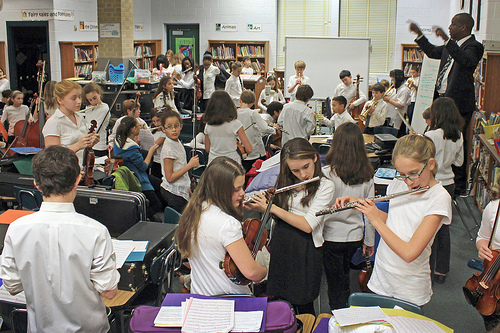Pssst… Have I got a program for you
Exploring an ironic twist
I experienced many powerful moments while attending the Arts, Science and the Brain Conference last week in Toronto. The gathering, convened by Artssmarts, sought to engage participants in questions about how learning in the 21st century could be informed and enriched by current understandings of brain science.
I experienced many powerful moments while attending the Arts, Science and the Brain Conference last week in Toronto. The gathering, convened by Artssmarts, sought to engage participants in questions about how learning in the 21st century could be informed and enriched by current understandings of brain science. In particular, I was inspired by a focus on how the brain is affected by participation in artistic experiences, a focus which helped to frame the conference’s perspective and approach.
As expected, Arts, Science and the Brain left me with many ideas to consider andmany people with whom to connect in the days following the experience, but it also left me considering a disturbing thread of irony that was woven throughout the two day event. Many of the conference’s presenters, panelists and “vendors” brought with them either a program or an approach through which they hoped to connect classrooms, teachers and students. Many of these programs were geared towards engaging students in emotionally compelling experiences with an eye to building self-esteem, community and a sense of commitment and dedication to school. And therein lies the irony!

Photo by: woodleywonderworks at http://www.flickr.com/photos/wwworks/5278944151/
When I began my career, schools were a place where the arts, phys-ed and community-building were part of the work that we did as educators. Robust extra-curricular programs, musical and dramatic productions, leadership retreats and field trips were as important to the life of the school as math, science, English and French. While many secondary schools have been able to maintain diverse programming for students, my experience in K-8 has been that those very things that formed the connective tissue in our schools have gradually been sidelined in favour of direct attention to the numeracy and literacy agenda. This has created a serious void in the school experience for many of our students, resulting in decreases in the very dimensions that we are now trying to retrieve and renew.
Unfortunately, in our attempt to retrieve and replenish those things that we now know are life-giving and so essential to the growth and development of our young people, many school districts have begun to realize two important things. First, in downplaying the importance of what were considered “extras”, a great deal of expertise was lost among educators. Not only did many teachers passionate about (and trained in) the arts, phys-ed and technical subjects move their expertise to places where it could be used, but systems that no longer valued this knowledge and training failed to attract educators with that background and skill set.
Second, with test scores forming essential indicators of success in many jurisdictions, it has now become difficult to find the time and space for the arts, phys-ed, and the extra-curricular programs that have now made their way back onto the radar.
As a result, these dimensions of school life are, in an ever-increasing sense, becoming “contracted out” to companies and organizations that offer programs that will build character, self-esteem, community, artistic appreciation, creativity and financial literacy. Cottage industries are springing up to support and teach things that were once considered integral parts of school life. And those dimensions that were, at one time, intimately woven into the lessons and activities that took place in our classrooms, before, during and after school are, in many cases, being placed within school assemblies and programs offered outside of the school day.
While the innovative approaches, knowledge and resources offered by the increasing number of outside contractors that are knocking at the school house door are attractive and not without value, they also provide a warning signal about the way our educational systems might look in another decade. When expertise and important elements of program are contracted out, our schools begin to look and feel different.
This is attractive to some, presents opportunities to others but, for me, opens up a whole new set of questions about equity and school quality.
